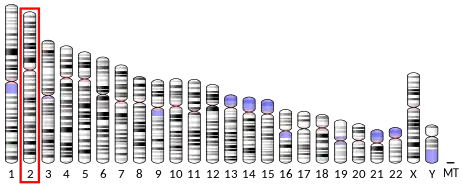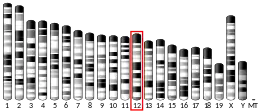ADCY3
Adenylyl cyclase type 3 is an enzyme that in humans is encoded by the ADCY3 gene.[5][6]
Function
This gene encodes adenylyl cyclase 3, which is a membrane-associated enzyme and catalyzes the formation of the secondary messenger cyclic adenosine monophosphate (cAMP).[6]
The ADCY3 subtype likely mediates odorant detection (possibly) via modulation of intracellular cAMP concentration.[7]
References
- GRCh38: Ensembl release 89: ENSG00000138031 - Ensembl, May 2017
- GRCm38: Ensembl release 89: ENSMUSG00000020654 - Ensembl, May 2017
- "Human PubMed Reference:". National Center for Biotechnology Information, U.S. National Library of Medicine.
- "Mouse PubMed Reference:". National Center for Biotechnology Information, U.S. National Library of Medicine.
- Yang B, He B, Abdel-Halim SM, Tibell A, Brendel MD, Bretzel RG, Efendic S, Hillert J (Jan 1999). "Molecular cloning of a full-length cDNA for human type 3 adenylyl cyclase and its expression in human islets". Biochemical and Biophysical Research Communications. 254 (3): 548–551. doi:10.1006/bbrc.1998.9983. PMID 9920776.
- "Entrez Gene: ADCY3 adenylate cyclase 3".
- "Gene Cards: ADCY3 Gene". Retrieved 2012-12-30.
External links
- Human ADCY3 genome location and ADCY3 gene details page in the UCSC Genome Browser.
Further reading
- Gaudin C, Homcy CJ, Ishikawa Y (Nov 1994). "Mammalian adenylyl cyclase family members are randomly located on different chromosomes". Human Genetics. 94 (5): 527–9. doi:10.1007/BF00211020. PMID 7959689. S2CID 40521157.
- Haber N, Stengel D, Defer N, Roeckel N, Mattei MG, Hanoune J (Jul 1994). "Chromosomal mapping of human adenylyl cyclase genes type III, type V and type VI". Human Genetics. 94 (1): 69–73. doi:10.1007/BF02272844. PMID 8034296. S2CID 6473135.
- Hellevuo K, Yoshimura M, Kao M, Hoffman PL, Cooper DM, Tabakoff B (Apr 1993). "A novel adenylyl cyclase sequence cloned from the human erythroleukemia cell line". Biochemical and Biophysical Research Communications. 192 (1): 311–318. doi:10.1006/bbrc.1993.1415. PMID 8476432.
- Wei J, Wayman G, Storm DR (Sep 1996). "Phosphorylation and inhibition of type III adenylyl cyclase by calmodulin-dependent protein kinase II in vivo". The Journal of Biological Chemistry. 271 (39): 24231–24235. doi:10.1074/jbc.271.39.24231. PMID 8798667.
- Nagase T, Ishikawa K, Miyajima N, Tanaka A, Kotani H, Nomura N, Ohara O (Feb 1998). "Prediction of the coding sequences of unidentified human genes. IX. The complete sequences of 100 new cDNA clones from brain which can code for large proteins in vitro". DNA Research. 5 (1): 31–39. doi:10.1093/dnares/5.1.31. PMID 9628581.
- Wei J, Zhao AZ, Chan GC, Baker LP, Impey S, Beavo JA, Storm DR (Sep 1998). "Phosphorylation and inhibition of olfactory adenylyl cyclase by CaM kinase II in Neurons: a mechanism for attenuation of olfactory signals". Neuron. 21 (3): 495–504. doi:10.1016/S0896-6273(00)80561-9. PMID 9768837. S2CID 9860137.
- Barcova M, Speth C, Kacani L, Uberall F, Stoiber H, Dierich MP (Mar 1999). "Involvement of adenylate cyclase and p70(S6)-kinase activation in IL-10 up-regulation in human monocytes by gp41 envelope protein of human immunodeficiency virus type 1". Pflügers Archiv. 437 (4): 538–546. doi:10.1007/s004240050815. PMID 10089566. S2CID 7620262.
- Speth C, Joebstl B, Barcova M, Dierich MP (Apr 2000). "HIV-1 envelope protein gp41 modulates expression of interleukin-10 and chemokine receptors on monocytes, astrocytes and neurones". AIDS. 14 (6): 629–636. doi:10.1097/00002030-200004140-00001. PMID 10807185. S2CID 22105709.
- Patke CL, Shearer WT (May 2000). "gp120- and TNF-alpha-induced modulation of human B cell function: proliferation, cyclic AMP generation, Ig production, and B-cell receptor expression". The Journal of Allergy and Clinical Immunology. 105 (5): 975–982. doi:10.1067/mai.2000.105315. PMID 10808179.
- Vanvooren V, Allgeier A, Cosson E, Van Sande J, Defer N, Pirlot M, Hanoune J, Dumont JE (Dec 2000). "Expression of multiple adenylyl cyclase isoforms in human and dog thyroid". Molecular and Cellular Endocrinology. 170 (1–2): 185–196. doi:10.1016/S0303-7207(00)00322-1. PMID 11162902. S2CID 20099267.
- Patrizio M, Colucci M, Levi G (Apr 2001). "Human immunodeficiency virus type 1 Tat protein decreases cyclic AMP synthesis in rat microglia cultures". Journal of Neurochemistry. 77 (2): 399–407. doi:10.1046/j.1471-4159.2001.00249.x. PMID 11299302. S2CID 24053412.
- Côté M, Guillon G, Payet MD, Gallo-Payet N (Sep 2001). "Expression and regulation of adenylyl cyclase isoforms in the human adrenal gland". The Journal of Clinical Endocrinology and Metabolism. 86 (9): 4495–4503. doi:10.1210/jcem.86.9.7837. PMID 11549699.
- Speth C, Schabetsberger T, Mohsenipour I, Stöckl G, Würzner R, Stoiber H, Lass-Flörl C, Dierich MP (Apr 2002). "Mechanism of human immunodeficiency virus-induced complement expression in astrocytes and neurons". Journal of Virology. 76 (7): 3179–3188. doi:10.1128/JVI.76.7.3179-3188.2002. PMC 136041. PMID 11884542.
- Kobayakawa K, Hayashi R, Morita K, Miyamichi K, Oka Y, Tsuboi A, Sakano H (Jul 2002). "Stomatin-related olfactory protein, SRO, specifically expressed in the murine olfactory sensory neurons". The Journal of Neuroscience. 22 (14): 5931–7. doi:10.1523/JNEUROSCI.22-14-05931.2002. PMC 6757947. PMID 12122055.
- Ludwig MG, Seuwen K (2003). "Characterization of the human adenylyl cyclase gene family: cDNA, gene structure, and tissue distribution of the nine isoforms". Journal of Receptor and Signal Transduction Research. 22 (1–4): 79–110. doi:10.1081/RRS-120014589. PMID 12503609. S2CID 36697419.
- Katsel PL, Tagliente TM, Schwarz TE, Craddock-Royal BD, Patel ND, Maayani S (Feb 2003). "Molecular and biochemical evidence for the presence of type III adenylyl cyclase in human platelets". Platelets. 14 (1): 21–33. doi:10.1080/0953710021000062905. PMID 12623444. S2CID 7194996.
- Celano M, Arturi F, Presta I, Bruno R, Scarpelli D, Calvagno MG, Cristofaro C, Bulotta S, Giannasio P, Sacco R, Filetti S, Russo D (May 2003). "Expression of adenylyl cyclase types III and VI in human hyperfunctioning thyroid nodules". Molecular and Cellular Endocrinology. 203 (1–2): 129–135. doi:10.1016/S0303-7207(03)00086-8. PMID 12782409. S2CID 24573371.
This article is issued from Wikipedia. The text is licensed under Creative Commons - Attribution - Sharealike. Additional terms may apply for the media files.





